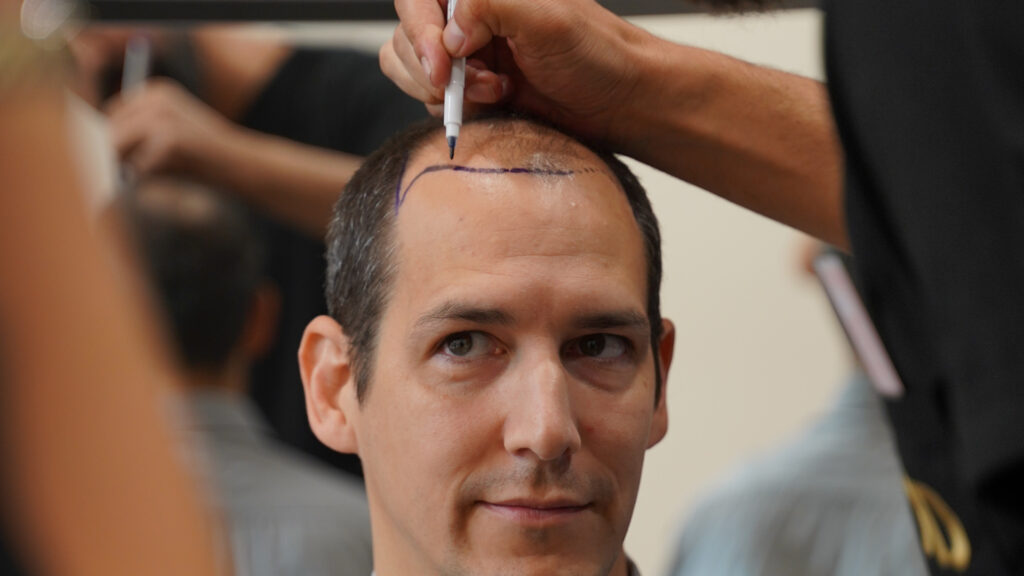Now considered as the world capital for hair transplant, Turkey welcomes several hundred thousand of hair transplant candidates each year. Among the different techniques available, manual FUE hair graft offers the best success rate for hair implant, for both men and women. Manual Follicular Unit Excision, or FUE for short, is the process of taking individual hair follicles from one area of the body and transplanting them to another for the stimulation of new hair growth in areas with thinning or baldness. This hair restoration procedure is increasingly popular with men and women worldwide, with over 650,000 hair transplant surgeries undergone annually, according to The Hair Society.
What is the FUE hair graft technique ?
The FUE (Follicular Unit Extraction) hair transplant technique is today the most popular hair graft method. Unlike FUT, an older system that extracts entire strips of follicles from the donor area and replants them on bald areas of the head, FUE is less invasive, less painful and healthier, leaves no scars on the scalp, and offers much higher chances of success for thicker and more natural regrowth of the grafted hair.
The operation, performed under local anesthesia, generally lasts from 2 to 7 hours depending on the extent of baldness, and consists of extracting grafts from the donor area – usually the back of the head – to replant them in the thinning area. Once the patient’s head is shaved, the surgeon draws the extraction and reimplantation areas of the healthy follicles, then uses a robotic punch or a manual punch to extract the grafts, and replant them on the recipient area. The result of the graft is visible between 8 to 12 months after the operation, and final.
The FUE transplant is suitable for all hair types, whether straight or frizzy, thin or thick. However, with the rapid evolution of medical technology and tools available to hair surgeons, several distinct methodologies of extraction and grafting of follicles are now available. Depending on the type of hair and the extent of baldness, the clinical diagnosis and the budget, the patient can now choose between manual, motorized or robotic FUE.
The different available techniques for removing follicles
There are two techniques to perform an FUE hair transplant, robotic ARTAS FUE (IFA) and manual FUE.
Extraction of the grafts by assisted or robotic FUE
The hair surgeon can use a motorized punch to extract the grafts from the donor area. This micro-punch has a variable speed motor (between 100 and 15,000 revolutions per minute) that will automatically surround the follicular unit without manual effort, and extract it more quickly and easily from the scalp. The robotic punch is even more precise and faster in the process of extracting the bulbs. A first punch will slice the follicle, followed by a second, unsharpened punch that will puncture the epidermal tissue surrounding the follicle. The robotic system, installed directly on the patient’s skull, will identify and analyze the depth, angle of growth and density of the follicles, thanks to its stereoscopic cameras managed by an image processing software, helping the surgeon to choose the healthiest grafts. Several models of robots are used in the different clinics : ARTAS, WAV or SAFER, to name a few. Despite the tremendous technological advances offered by these FUE robots, the risk of damaging the grafts, as well as their survival time, are still higher and less guaranteed than with the manual FUE method.

Manual FUE grafts extraction
Unlike the extraction performed with a motorized micro-punch, the manual transplantation is done with a manual punch : the surgical gesture of the micro-punch is to make an alternating rotation around the follicle, then to extract it with a micro-clamp. The surgeon thus has better control over his intervention and can better adapt it to the physiological conditions of the scalp. This technique limits the risks of torsion, friction and heating of the follicles and causes less damage to the neighboring grafts than with a motorized punch. Moreover, the manual extraction is performed in lateral slit, unlike the motorized micropunch which must be placed vertically to the scalp for the extraction of the graft.

Implantation of the grafts
Once harvested, the grafts will be placed in a sterile aqueous solution, awaiting their transplantation into the receiving area within one hour of their extraction, once the grafting paths have been made. For an optimal result, the follicles will be re-implanted manually, with a prior opening of the ducts using a sapphire blade. However, for a less invasive result, the follicles can be reimplanted using the DHI (Direct Hair Implant) method with a Choi implant pen : the extraction and the implantation are performed at the same time.
To ensure the success of the hair transplant, it is advisable to double the operation with a PRP treatment (platelet-rich plasma reinjected into the recipient area), offering the transplanted hair the best chances of regrowth.


What are the advantages of manual FUE hair graft ?
More precise, less invasive and less traumatic for the hair epidermis, manual FUE guarantees a better survival of the follicle, with a transection rate (loss of the graft) of 1 to 3%, while the transection rate reaches 10 to 15% with a motorized micro-punch procedure, conducted by an experienced surgeon. As the neighboring grafts and the donor area are better preserved, and the epidermis is less damaged by the operation (no bruises or scars), the extracted grafts are less likely to be thinned (a graft can contain up to 4 follicles), and the hair grows back better in the donor area. Thus, after 48 hours, the donor area is already healed, offering a more discreet transplantation. Above all, the follicles are reimplanted in a denser manner, offering a fuller and more natural regrowth. Another advantage is that the patient is in a sitting position under the surgeon’s scalpel, allowing him to be operated in a more comfortable and less tiring way, especially when the sessions last several hours.
What are the disadvantages of manual FUE hair graft ?
The use of a manual punch requires a surgical gesture of great dexterity, and takes more time than a robotic punch. In one session, of 7 hours maximum, an experienced surgeon will treat up to 2000 grafts. This is enough time to cover an incipient baldness, but when the alopecia is total, it is necessary to spread the graft over two to three sessions.
Since the procedure is longer and requires more experience, a manual hair transplant is also more expensive than a motorized micro-punch transplant.

What to expect
After identifying a donor area, surgeons isolate and extract follicles with a manual punch. Harvested follicles are then grafted through either micro-incisions or an implanter pen in the target area.
The cost of FUE depends on the number of hair grafts required, your hair type and texture, how many surgeons are available in your area, their skill, and how in-demand their services are. For the treatment of moderate hair loss, you can typically expect to pay between £3,000 and £8,000 per session in the UK.
More extensive operations will require multiple sessions spread over a number of days. Many patients opt to undergo the procedure in countries like Turkey and Thailand, where the costs are considerably lower. The added benefit of a holiday has given rise to the term “aesthetic tourism”.
It is normal for the recipient area to experience some swelling or discomfort during the first three days, and some hairs may fall out during recovery. Noticeable results can be seen within three to four months.
What is the price of a manual FUE hair graft ?
- Turkey : 3000 to 4000€
- Switzerland : 5000 to 10000€
- Belgium : 4500 to 8000€
- UK : 4000 to 6000£
Our verdict
For the treatment of hair loss, manual FUE is a safe outpatient procedure that should last a lifetime. Although slightly more time-consuming and expensive than automated FUE, it is far more accurate and gentler on the follicles, reducing the chances of any adverse outcomes or side effects.
Before booking your cosmetic getaway, focus on the results of your chosen clinic, as with any medical procedure. However, you should always consult with a specialist.
27694 vues
2 commentaires
0






2 Commentaire(s)
It is a great blog post.I am always read your blog helpful and informative tips. I like it thanks for sharing this information with us
Great blog post.Helpful and informative tips. I like it thanks for sharing this information with us